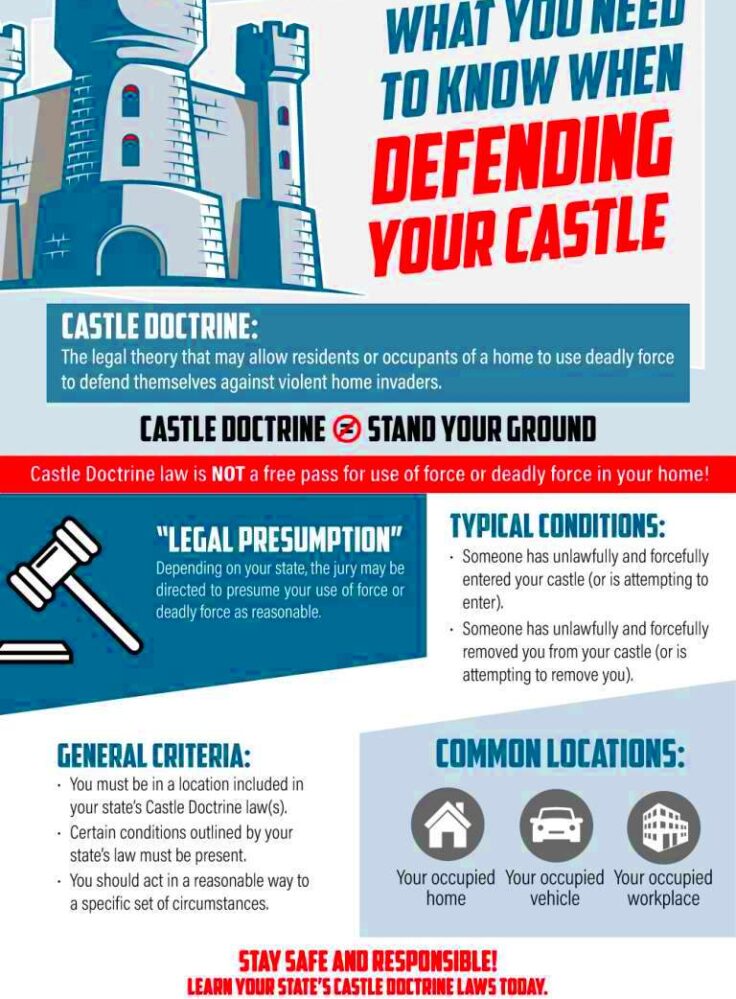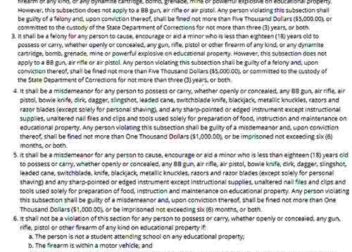Louisiana Castle Doctrine Law Explained
The Castle Doctrine in Louisiana plays a role in the states self defense laws. It permits individuals to use force, even lethal force to safeguard themselves within their residences or other locations where they have the right to be. This principle draws inspiration from the notion that ones home serves as a fortress a sanctuary where one should feel protected and secure. Grasping the intricacies of this law is vital particularly if you ever encounter a scenario where self protection or safeguarding your loved ones becomes necessary. Being aware of your entitlements and obligations, within the framework of this doctrine can significantly impact how you navigate such circumstances.
Definition and Purpose of the Castle Doctrine

The Castle Doctrine is based on the idea that people should be able to defend themselves against intruders and dangers in their own homes. Put it allows homeowners to use force to safeguard their property and family members from immediate danger without having to back down. Here’s a summary of the key points you should be aware of.
- Definition: The Castle Doctrine permits the use of force, including lethal force, against someone who unlawfully enters your home or is about to commit a serious crime against you or your family.
- Purpose: The primary goal is to empower individuals to protect themselves and their loved ones without fearing legal repercussions, as long as their actions are justified.
Based on what I’ve seen this legislation can bring a sense of comfort particularly for those residing in areas where safety is a concern. It underscores the importance of being able to protect oneself swiftly within the confines of ones home providing a sense of reassurance during moments of distress.
Eligibility for Applying the Castle Doctrine in Louisiana
In Louisiana the Castle Doctrine comes into play in situations and it’s important to know who can use this law. To qualify for its protection keep these factors in mind.
- Property Ownership: The doctrine applies if you are the legal occupant of the property, whether as an owner or a lawful resident.
- Unlawful Entry: The doctrine covers situations where someone unlawfully enters your home or property. The entry must be without permission and with intent to commit a crime.
- Reasonable Belief: You must have a reasonable belief that the intruder poses an imminent threat of serious harm or death.
- Lawful Presence: You must be in a place where you have a legal right to be. For instance, the doctrine does not apply if you are trespassing on someone else’s property.
From my point of view its important to highlight that the purpose of the law is to enable individuals facing threats to protect themselves adequately as long as they fulfill certain criteria. This strategy can serve as a source of empowerment and act as a powerful disincentive, for unlawful behavior.
When and Where the Castle Doctrine Applies
The Castle Doctrine in Louisiana isn’t merely an idea; it comes into play in situations. To comprehend the circumstances under which this doctrine is relevant it’s crucial to recognize a few aspects.
- In Your Home: The doctrine most commonly applies within the confines of your home. If someone breaks into your house, you are generally protected under this law if you use force to defend yourself and your family.
- On Your Property: Beyond just the home, the Castle Doctrine can extend to your property. This includes your yard or any outbuildings on your land. However, the specifics can vary, and it’s wise to be familiar with local regulations.
- In Transit: While the doctrine primarily applies to your home, it doesn’t cover scenarios outside of your property unless you are in a situation that mirrors self-defense principles. For instance, if you are attacked while traveling, different self-defense laws may apply.
Looking back on my experiences I’ve realized that grasping the limits of this principle is just as crucial as knowing how to navigate within them. Take for instance the act of defending oneself in a setting it doesn’t necessarily align with the Castle Doctrine. However being aware of these subtleties can offer clarity during moments.
Legal Protections and Limitations under the Castle Doctrine
The Castle Doctrine provides various safeguards but also has its own restrictions. Being aware of these limitations can assist in ensuring that your defensive actions are legally warranted.
- Protections:
- Use of Force: You are allowed to use reasonable force to defend yourself and your loved ones from an intruder.
- Presumption of Reasonableness: The law presumes that if someone unlawfully enters your home, you acted reasonably in defending yourself, which can be a strong legal safeguard.
- Limitations:
- Proportionality: The force used must be proportional to the threat. Lethal force is only justified if the threat is of imminent serious harm or death.
- Unlawful Actions: The doctrine doesn’t cover actions taken while committing a crime or if you provoke the situation leading to the need for self-defense.
Based on my own experiences it’s important to grasp these limitations. For example resorting to force or going beyond these limits can result in legal issues even if the law is intended to be protective. It’s a matter of finding a balance between the right to defend oneself and the duty not to cross legal boundaries.
Steps to Take if You Use Force under the Castle Doctrine
If you ever find yourself having to use force in a situation covered by the Castle Doctrine there are crucial steps to take to safeguard your actions legally.
- Call Law Enforcement: Immediately report the incident to the police. Provide a clear and accurate account of what happened. Your prompt report can be vital in establishing the context of the defensive action.
- Seek Medical Attention: If anyone is injured, make sure to get medical help for yourself and others involved. Documenting injuries can be important for legal purposes.
- Consult an Attorney: Contact a legal professional who specializes in self-defense cases. They can guide you through the legal process and help protect your rights.
- Document Everything: Keep detailed records of the incident, including any evidence, witness statements, and the police report. This documentation can be crucial in any legal proceedings.
I believe that dealing with the consequences of employing force can be just as tough as the initial situation. Having a well thought out approach and being aware of your actions can greatly impact the progression of the case. Taking care to adhere to these procedures can assist you in maneuvering through the intricacies with more assurance and transparency.
Differences between Castle Doctrine and Stand Your Ground Laws
Grasping the subtleties between the Castle Doctrine and Stand Your Ground laws is essential for those dealing with self defense matters. While both statutes permit the use of force for self protection they come into play in situations.
- Castle Doctrine: This doctrine specifically applies to one’s home or property. It essentially means you don’t have to retreat if you’re confronted with a threat in your own home. The focus is on the security of the home environment.
- Stand Your Ground Laws: These laws extend the right to use force beyond the home. They allow individuals to use force, including lethal force, in public spaces where they have a legal right to be. Unlike the Castle Doctrine, Stand Your Ground laws do not require a person to retreat from a threat before using force.
Looking back on my experiences I’ve noticed how these differences can sway legal results. For example if someone uses force in a situation they might have to show that they had no reasonable choice to back away. On the other hand a person protecting their home doesn’t have to meet this standard. It’s a nuance but important distinction that can affect the way self defense cases are evaluated.
Recent Case Law and Examples in Louisiana
Recent court rulings in Louisiana shed light on the application and interpretation of the Castle Doctrine. Examining these cases can enhance our understanding of how the doctrine operates in real life situations.
- Case Example 1: In a recent case, an individual was found to have acted within their rights under the Castle Doctrine when they used force to repel an intruder in their home. The court upheld the use of force as justified, emphasizing the presumption of reasonableness when defending one’s home.
- Case Example 2: Another case involved an individual who used deadly force in their garage to prevent an intruder from entering their home. The court ruled that the doctrine applied, as the garage was considered an extension of the home, thus allowing for the use of force.
In my view these cases show how judges assess the use of the Castle Doctrine. They highlight the significance of grasping how different scenarios are viewed from a legal standpoint and emphasize the necessity of possessing information and records when dealing with situations.
Frequently Asked Questions
Here are a few frequently asked questions regarding the Castle Doctrine in Louisiana along with their responses.
- Can I use force if someone is merely trespassing on my property? Generally, the Castle Doctrine applies to situations where there is a threat of harm. If someone is simply trespassing without posing an immediate threat, the use of force might not be justified.
- Does the Castle Doctrine apply if I am in a rental property? Yes, the doctrine applies if you are a lawful occupant of the property, whether you own it or rent it. The key is that you must have the legal right to be there.
- What should I do if I accidentally injure an intruder? Even if the injury was accidental, you should still follow legal procedures: call the police, seek medical attention, and consult with a lawyer to ensure your actions are well-documented and justified.
- Are there any situations where the Castle Doctrine might not apply? Yes, if you were engaging in criminal activity or if the force used was excessive or not proportional to the threat, the doctrine might not protect you.
In my observations these inquiries frequently come up when people talk about self defense. Being knowledgeable and ready can greatly impact how you navigate such circumstances and help you protect your rights in a responsible manner.
Conclusion
Grasping the intricacies of the Louisiana Castle Doctrine can offer reassurance when it comes to safeguarding your residence and belongings. This principle guarantees that you can defend yourself and your family against threats without needing to back down. Understanding the specifics of its application including the distinctions between this doctrine and other self defense laws such as Stand Your Ground is crucial. Recent legal cases shed light on how these concepts are implemented in situations underscoring the importance of having a clear awareness of your rights and obligations.
Whether you own a house or just want to stay updated on your rights understanding the ins and outs of the Castle Doctrine can be quite empowering. It serves as a reminder that although we should strive to settle disputes peacefully the law backs you up in defending yourself when needed. Being well informed and ready can significantly impact how you navigate through these intricate legal matters ensuring that you are prepared to respond in a responsible and efficient manner, during any challenging circumstance.


